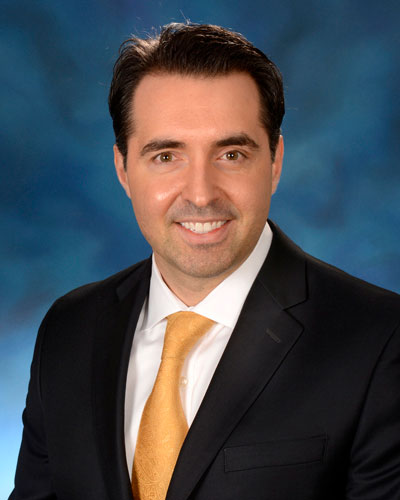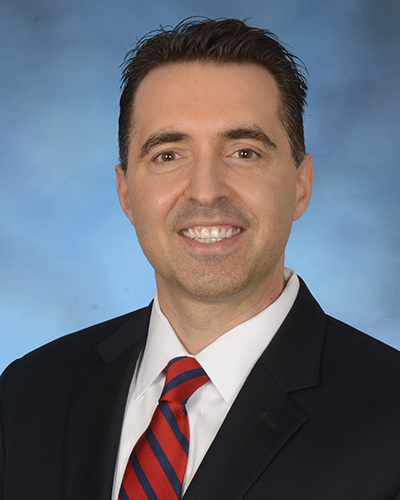November 04, 2019 | Deborah Kotz

Experiential Education Course Designed to Increase Future Physicians’ Health and Nutrition Knowledge to Improve Patient and Self Care
First- and second-year medical students at the University of Maryland School of Medicine (UMSOM) have a new requirement this year in order to earn their medical degree: culinary medicine. Among the first medical schools in the nation to implement the required course, UMSOM aims to increase future physicians’ nutrition knowledge through a class that combines didactic lectures on the evidence supporting many different approaches to healthy eating with experiential techniques that involve the proper chopping of onions, sautéing of vegetables, and garnishing of freshly baked salmon.
As they whip up an avocado chocolate mousse and cauliflower rice, these students learn how to integrate better nutrition and health into their medical education and patient care. This is part of UMSOM’s efforts to not only educate emerging doctors on the principles of nutrition to help them better care for their patients, but also to improve their own health and wellness. Research suggests these culinary courses help lead to improved wellness, reduced risk of burnout and improved self-care – all of which can help students better manage the pressures and rigors of medical training that continues for years after they earn their MD’s.
“This is an evidenced-based program that fills important gaps in medical education by teaching about nutrition’s critical role in chronic diseases and how to use cooking to inspire healthy dietary changes,” said Chris D’Adamo, PhD, an Assistant Professor of Family & Community Medicine and Director of the Center for Integrative Medicine at UMSOM, who teaches the culinary medicine course. “We teach the general principles of a whole-foods based diet. We do not, however, advocate for any one diet in particular, taking into account an individual’s unique health needs, taste preferences, and cultural influences.”
In a survey of more than 250 first- and second-year UMSOM medical students who received a single 2.5 hour session of culinary medicine training, 80 percent of the students reported that the class will help them offer practical nutrition advice to future patients, and 87 percent reported that they will use the food preparation knowledge they learned in their own lives. In terms of measurable impact, 67 percent of the students reported that they feel “prepared” or “very prepared” to provide healthy eating recommendations to their patients compared to 38 percent of students prior to taking the culinary medicine workshop.
“I believe this nutrition training for medical students is crucial to giving the best care possible to our patients -- not only to treat their diseases but for prevention as well,” said first year medical student Kimia Abtahi.
Studies have found that doctors who provide lifestyle counseling can have a positive impact on their patients’ health: One 2014 analysis of data from the National Health and Nutritional Examination Survey found that overweight and obese patients whose doctors encouraged them to lose weight were twice as likely to lose at least 5 percent of their body mass over the following year. Medical School curriculum initiatives that make culinary medicine coursework mandatory can improve a student’s nutrition knowledge and skills significantly, according to a September study published in The Lancet Planetary Health, which also found that most doctors are lacking in these skills.
“This new component of the curriculum reflects our broader mission to train physicians who can properly care for their own health through good nutritional habits, and who can encourage patients to adopt healthier behaviors,” said Dean E. Albert Reece, MD, PhD, MBA. “Ultimately, the goal of our new curriculum is to produce ‘Renaissance’ physicians who are lifelong learners and critical thinkers, and who are compassionate, possess leadership skills, and care about social justice issues and the need for diversity.”
The UMSOM is one of the first in the country to include Culinary Medicine in the core curriculum.
Dr. D’Adamo and his Culinary Medicine team at the UMSOM Center for Integrative Medicine teaches the “food as medicine” course in collaboration with the Institute of Integrative Health in Baltimore, which includes use of their teaching kitchen and staff and with support from Performance Foodservice.
About the University of Maryland School of Medicine
Now in its third century, the University of Maryland School of Medicine was chartered in 1807 as the first public medical school in the United States. It continues today as one of the fastest growing, top-tier biomedical research enterprises in the world -- with 43 academic departments, centers, institutes, and programs; and a faculty of more than 3,000 physicians, scientists, and allied health professionals, including members of the National Academy of Medicine and the National Academy of Sciences, and a distinguished recipient of the Albert E. Lasker Award in Medical Research.
With an operating budget of more than $1 billion, the School of Medicine works closely in partnership with the University of Maryland Medical Center and Medical System to provide research-intensive, academic and clinically based care for more than 1.2 million patients each year. The School has over 2,500 students, residents, and fellows, and more than $540 million in extramural funding, with most of its academic departments highly ranked among all medical schools in the nation in research funding. As one of the seven professional schools that make up the University of Maryland, Baltimore campus, the School of Medicine has a total workforce of nearly 7,000 individuals. The combined School and Medical System (“University of Maryland Medicine”) has an annual budget of nearly $6 billion and an economic impact more than $15 billion on the state and local community.
The School of Medicine faculty, which ranks as the 8th highest among public medical schools in research productivity, is an innovator in translational medicine, with 600 active patents and 24 start-up companies. The School works locally, nationally, and globally, with research and treatment facilities in 36 countries around the world. Visit medschool.umaryland.edu
Contact
Department of Anesthesiology
(410) 328-6120 (phone)
(410) 328-5531 (fax)
swalsh@som.umaryland.edu
Deborah Kotz
Director of Media Relations
Office of Public Affairs & Communications
University of Maryland School of Medicine
o: 410-706-4255
c: 410-804-0054
t: @debkotz2
Related stories

Thursday, August 05, 2021
UM School of Medicine Study Finds Culinary Medicine Training Improves Medical Students’ Nutrition Knowledge and Confidence in Counseling Patients
Medical school students who took a three-hour culinary medicine training course reported feeling more confident in their nutritional knowledge and in their abilities to counsel patients on healthy eating habits, according to a new study from the University of Maryland School of Medicine (UMSOM). The study involved 119 UMSOM medical students who participated in a class that includes a nutrition lecture and cooking lessons in a demonstration kitchen at the Institute for Integrative Health, a non-profit organization based in Baltimore. Culinary medicine training is now required as part of the new Renaissance Curriculum instituted last year at UMSOM. The study was published last month in the American Journal of Lifestyle Medicine.
